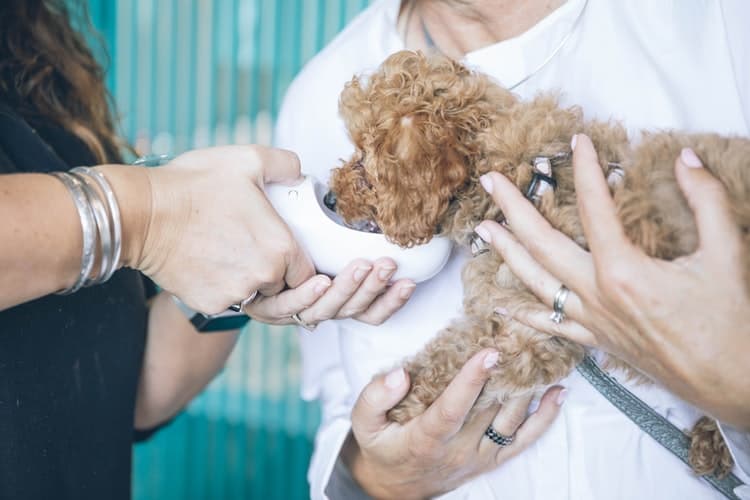As a responsible pet owner, it’s up to you to provide the best care your dogs deserve. This includes core vaccines that keep your dog protected from serious diseases. However, with so many doubts around vaccines, it is natural to ask yourself “What vaccines do dogs need annually?”.
Contents
- 1 What Vaccines Do Dogs Need Annually?
- 1.1 Core Dog Vaccines
- 1.2 Do Vaccines Carry Risky Side Effects?
- 1.3 What Is Titer Testing?
- 1.4 Do Puppies Need to be Vaccinated Every Year?
- 1.5 At What Age Do You Stop Vaccinating Your Dog?
- 1.6 Do Puppies Need Different Vaccines Than Grown Dogs?
- 1.7 Do Elderly Dogs Need Boosters?
- 1.8 What Happens if Your Dog is Not Vaccinated?
- 2 Conclusion
What Vaccines Do Dogs Need Annually?
Primary vaccination is important if you want to prevent your dog from getting common deadly puppy diseases. According to Dr. Rania Gollakner, BS DVM, recent research has indicated that not all vaccines require yearly boosters. That being said, there are two different vaccines that I will suggest.
Core vaccines and non-core vaccines. Core pet vaccines like DA2PPv are the standard recommended annual vaccines for pets and are commonly administered at an early age with a second vaccination after a year. Also, I recommend: Bordetella bronchiseptica, Borrelia burgdorferi, and Leptospira bacteria vaccinations.
Non core vaccinations are administered depending on your dog’s immune system, overall health, and lifestyle. Non core vaccinations, along with core vaccinations, can be given to your canine as early as 6 weeks old. We can always talk about what non-core and core vaccinations your canine needs and set up a dog’s vaccination schedule that’s convenient for you.
Core Dog Vaccines
Core vaccinations are what vets would usually recommend to your puppies because they’re essential to protect them from life-threatening diseases and pain-causing diseases. There are four core vaccines for dogs: dog parvovirus, canine distemper, canine hepatitis, and rabies.
Rabies 1-year
You can start to administer your pet one dose of the rabies vaccine as early as 3 months of age during your first visit. Most states regulate the age at which you need to first administer them. This is a core dog vaccine and they’ll need to get booster shots annually.
This disease is fatal to canines and there are no treatments available for it. That’s why getting your pet immunized helps prevent it.
Rabies 3-year
While it is similar to the above, it differs in terms of the schedule for vaccination. I will recommend a second vaccination after one year. After that, instead of getting vaccination boosters annually, you only have to do it every three years.
Distemper
Distemper is also a core dog vaccine. You need at least 3 doses given between 6 and 16 weeks of age. Your pet will need a booster one year after completing the initial puppy series of vaccinations. After that, adult dogs need to get a booster every three years. This will protect your dog against an airborne virus that causes Distemper, a real disease that may cause permanent brain damage.
Parvovirus
You need at least 3 doses between 6 and 16 weeks of age. Puppies require a booster 1 year after completing the initial series. After that, your dog would need a booster every 3 years. Canine “parvo” is contagious and can cause severe vomiting and bloody diarrhea. If left untreated, it can prove fatal to your dog.
Adenovirus, type 1
You also need 3 doses between 6 and 16 weeks of age. A puppy vaccionation needs a booster 1 year after you complete the initial series and then you’ll need a booster every three years. Adenovirus, type 1 can spread via infected urine and feces and can lead to severe liver damage and death.
Adenovirus, type 2
You also need 3 doses between 6 and 16 weeks of age. Puppies need a booster 1 year after you complete the initial series. You’ll also need a booster every 3 years. This virus can spread via coughs and sneezes.
Do Vaccines Carry Risky Side Effects?
After knowing what shots do dogs need yearly, you need to learn about the potential side effects they might have.While they carry a small risk of side effects, most canines don’t experience severe reactions.
The most common side effects are fever, soreness, and lethargy for two or three days. Therefore, preventing life-threatening diseases such as canine parvovirus, outweighs these reactions.
What Is Titer Testing?
Titer testing is a useful tool that allows you to manage your dog’s shots. It can help you determine the level of antibodies in your dog’s blood. This helps to tell whether your pet is still immune to a specific disease, or not.
In some circumstances, this test can be used in place of regular vaccination. For instance, it might not be necessary to apply a booster vaccination to your dog if your dog’s titer test results are positive. This can help to prevent overvaccination and negative vaccine reactions.
However, titer testing can’t be used to evaluate every vaccine, and it’s not always accurate. Therefore, it’s crucial to go over the advantages and disadvantages of titer testing before taking any action.
Do Puppies Need to be Vaccinated Every Year?
There’s no evidence that annual booster shots aren’t beneficial to the majority of adult dogs. In fact, abstaining from some boosters can put your dog at risk. If you want to make sure boosters are necessary for your dog, you need to do a series of blood tests such as a titer test to study your dog’s immune system and measure the number of antibodies in your dog.
These tests are usually more expensive and revaccination is more of a suitable choice. Tests like the titer test may be stressful for your dog. Government regulatory bodies and organizations like the American Animal Hospital Association have strict guidelines for shots.
Manufacturers must prove that their vaccines are safe and effective before they release them on the market and make them usable for your dog.
At What Age Do You Stop Vaccinating Your Dog?
Canies older than seven years of age are classified as senior pets. Senior canines are in the stage of life where the aging process is starting to affect every organ on their immune system. Some organs wear out faster and slow down over time so it’s important that you keep track of your dog’s condition.
Keep your vaccinations current. Consult me to determine the proper vaccine schedule that is appropriate for your senior dog’s lifestyle. Commonly, adult dogs will get most shots every three years.
Some shots have a shorter duration of immunity. Some examples are leptospirosis, Lyme disease, and kennel cough. Your dog may receive a vaccination for these diseases more often, usually every six to twelve months.
Do Puppies Need Different Vaccines Than Grown Dogs?
Yes, puppies need a different set of shots than adult canines do. This is because they need help to boost their immunity against illnesses like distemper, parvovirus, and hepatitis. Therefore, they should receive these vaccinations beginning at around 6 to 8 weeks of age.
Do Elderly Dogs Need Boosters?
Yes, older canines require a booster vaccination to maintain their immunity to specific diseases. However, this can vary depending on the dog’s individual health status and vaccination history. That is why I check them first to determine their best vaccination schedule.
What Happens if Your Dog is Not Vaccinated?
Your dog may have a higher chance of getting diseases that can be fatal if left untreated. There are a number of studies that show vaccinations are effective at protecting grown dogs that are purposefully exposed to diseases in a controlled situation.
The wider the community your dog is in, the higher the risk of your pet getting exposed to unwanted sickness. A study in Poland in 2002 shows that immunized canines have a lower chance of getting Distemper compared to unvaccinated pups. 66% of the infected dogs have never been immunized while 22% of the infected dogs were immunized at some point.
Nowadays, the government requires certain shots for most dogs. One example of this is rabies, as it is not only harmful to your pets yet also to humans.
Conclusion
Vaccines for your puppy increase its protection against harmful diseases and reduce the risks of contracting one. It’s important for you to talk with me and discuss what shots are needed for your dog’s health and lifestyle.



